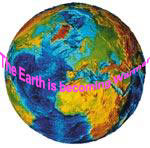 The Earth's temperature in the year 2001 is expected to be the second highest since global records began 140 years ago, the UN weather agency said. The Earth's temperature in the year 2001 is expected to be the second highest since global records began 140 years ago, the UN weather agency said.
The World Meteorological Organization said the warming temperatures led to an increase in the severity and frequency of storms and droughts and other unusual weather conditions.
"Temperatures are getting hotter, and they are getting hotter faster now than at any time in the past," said Michel Jarraud, the organization's deputy secretary-general. Nine of the 10 warmest years in the last four decades have occurred since 1990, and temperatures are rising three times faster than in the early 1900s, he said. This year's global average surface temperature was expected to be 57.96 Fahrenheit, the World Meteorological Organization said. The record, set in 1998, was 58.24 Fahrenheit. "Much of the temperature change is down to human influence," said Ken Davidson, director of the organization's climate program department. "There are always skeptics on everything, but certainly the evidence we have today shows we do have global warming, and that most of this is due to human action." Carbon dioxide produced from burning fossil fuels is the most prevalent of the so-called greenhouse gases, whose growing concentration in the atmosphere is thought to be warming the Earth. Many scientists believe the warming, if not stopped, will cause severe climate changes over the next century. Few critics disagree that global warming exists. But opinions diverge when scientists forecast the severity of the temperature hikes and their effects, with many skeptics believing the earth's atmosphere will adjust to changes. At a two-week conference in Morocco last month, negotiators from 165 countries agreed on rules for implementing the 1997 Kyoto Protocol, which calls on about 40 industrialized nations to limit carbon emissions or cut them to below 1990 levels. The United States, the world's largest polluter, has rejected the accord. It argues that the treaty would harm the U.S. economy and says it is unfair because it excuses heavily polluting developing countries like India and China from any obligations. Jarraud said that while greenhouse gas emissions in 2100 can't be predicted, "continued pollution at today's rate - or faster - presents several risks, especially a rise in sea-levels" as polar ice melts. "Many of the world's fastest developing cities are by the sea, and they could face floods, land erosion, and the pollution by salt water of fresh water supplies," he said. (Agencies) | 据联合国气象署报道,自从人类在140年前开始记录全球温度以来,2001年全球平均温度达到了历史上第二高度。 世界气象组织称,全球范围的气候变暖已经造成了风暴、旱灾的加剧和频繁发生,以及其它异常气候的出现。 该组织的副秘书长麦克·雅罗说:"全球的气温正在日益升高,而且升高的速度已经超过了以往任何时期。" 雅罗说,在过去40年中,年均气温排在前10位的年份有9年出现在1990年以后,现在全球温度的增长速度已经达到了90年代初的3倍。 世界气象组织称,今年全球平均地面温度将达到57.96华氏度(约14.42摄氏度),而历史上的最高记录是1998年的58.24华氏度(约14.58摄氏度)。 该组织气象节目制作部门的负责人肯·戴维森说:"全球气温变化很大程度上是人为原因造成的。人们总是对一切事情都持怀疑态度,但是现在所有的证据都表明我们的地球正在变暖,而且主要原因是人类自身的活动。" 人类燃烧矿物燃料(主要是煤)释放出的二氧化碳是造成所谓的"温室效应"的最主要原因。二氧化碳在大气中的含量不断增加造成了地球气温的升高。许多科学家认为,如果不对温室效应加以控制,它将会导致下个世纪的气候严重恶化。 但是也有少数科学家并不同意全球变暖的看法,即便是同意这一看法的科学家,在气温升高的速度及其影响等问题上也是各持己见,其中一些科学家认为地球的大气层能够通过自我调节来适应气温的变化。 上个月在摩洛哥举行了为期两周的讨论会,来自165个国家的谈判代表表示将严格执行1997年在日本制定的《京都议定书》,并呼吁世界上近40个工业国家将二氧化碳的排放量控制在1990年的水平以下。  然而世界上最大的环境污染者--美国对此却颇有微词,认为《京都议定书》阻碍了美国的经济发展,该议定书只针对发达国家,使得印度和中国等同样对环境造成污染的发展中国家得以逃避减排义务,这样是不公平的。 然而世界上最大的环境污染者--美国对此却颇有微词,认为《京都议定书》阻碍了美国的经济发展,该议定书只针对发达国家,使得印度和中国等同样对环境造成污染的发展中国家得以逃避减排义务,这样是不公平的。
雅罗说,尽管人类还无法预测到2100年全球的二氧化碳排放量,但是如果环境污染继续以目前的速度(或者更快的速度)加剧,人类将会面临若干威胁,其中最突出的威胁是海平面的升高,因为气温的升高,现在地球两极的冰雪正在不断融化。 他说:"世界上许多发展最迅速的城市都是沿海城市,它们将要面临洪水、土壤侵蚀以及海水倒灌引起的淡水供应紧张等威胁。" (中国日报网站译) |
